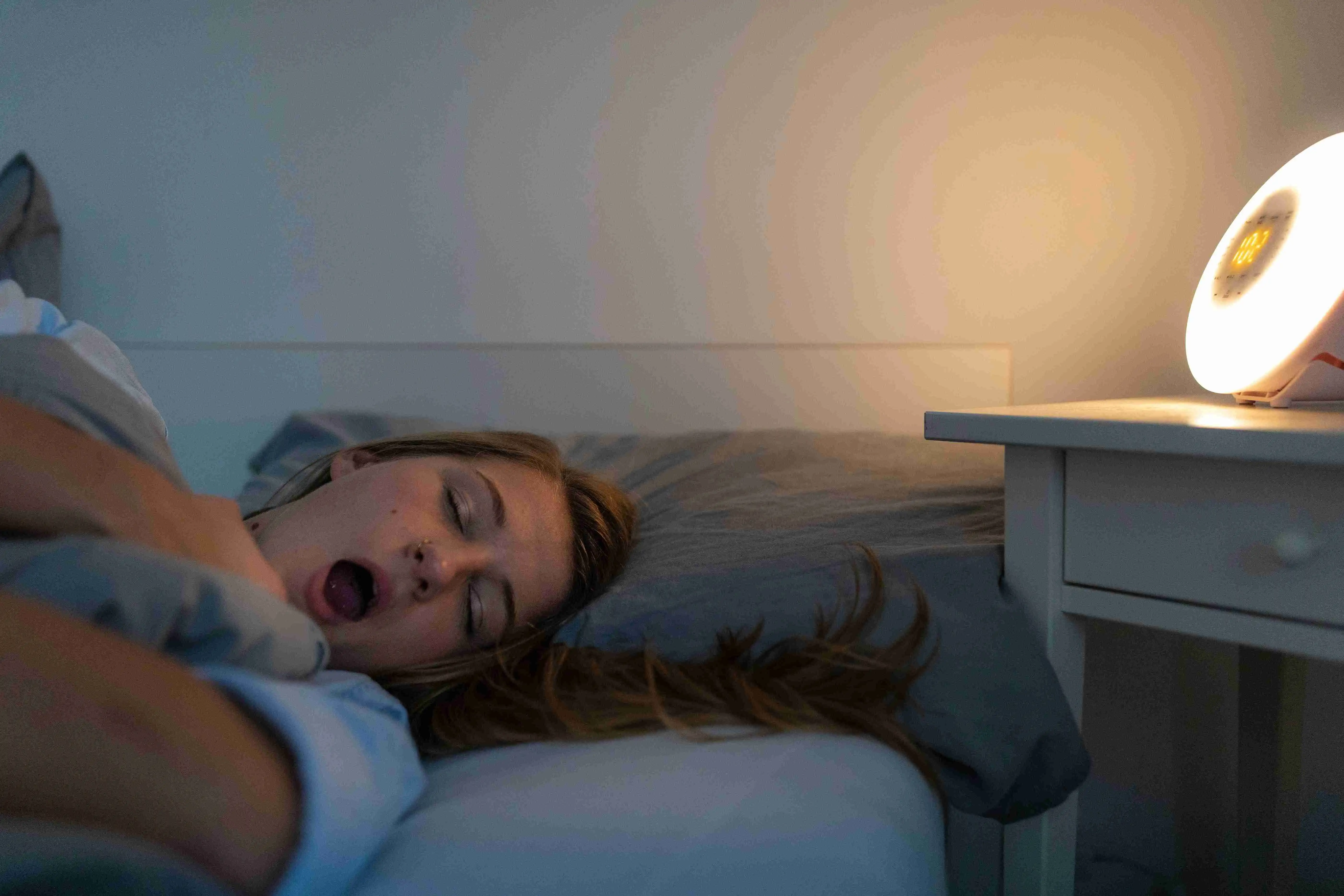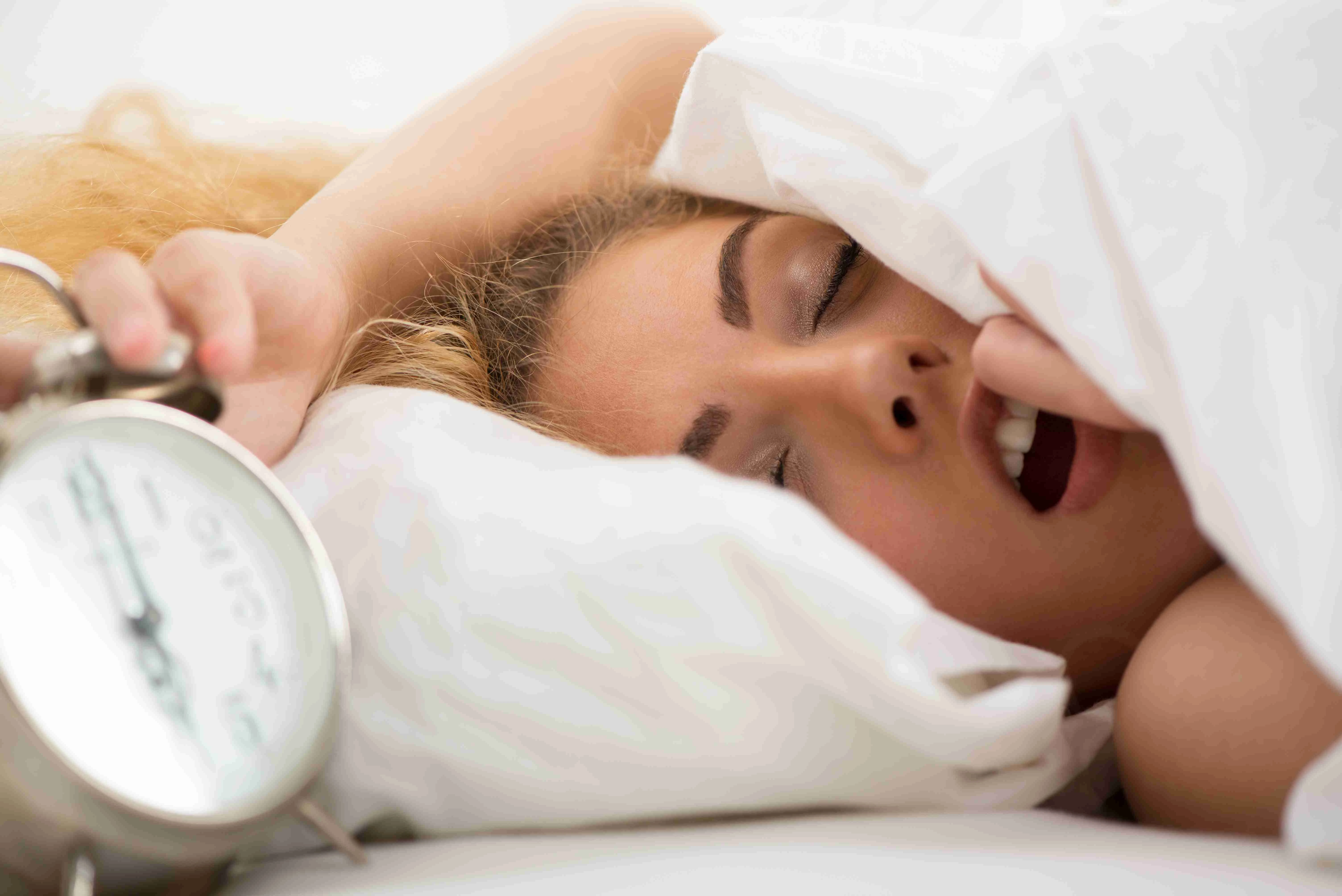Most humans breathe through their noses. This is how humans evolved, mostly as a survival technique so we could breathe while eating.
However, some people breathe more through their mouths, either as a trait or their physical makeup. Either way, mouth breathing can lead to health complications, especially while sleeping.
In this article, we will study the scientific reasons behind mouth breathing, why mouth breathing is bad for you, and the practical steps you can take to stop breathing through your mouth.
Key Takeaways
- Mouth breathing occurs when air is taken in through the mouth instead of the nose. It is often caused by nasal congestion, stress, or physical factors. Chronic mouth breathing can lead to health issues such as dry mouth, dental problems, and poor sleep quality.
- Nasal breathing filters the air you breathe, providing better oxygen intake and reducing infections. Mouth breathing lacks these benefits and can result in serious health consequences, like poor sleep quality, cognitive decline, and increased susceptibility to airborne infections.
- Practising breathing exercises, improving your sleep environment, and training the body for nasal breathing using tools like mouth tape or nasal strips can help prevent mouth breathing.
What Is Mouth Breathing?

Mouth breathing, also known as chronic oral ventilation, occurs when people rely on their mouths to take in air rather than the nose. It can be a temporary response to nasal congestion, a symptom of an underlying health issue, or a habit. Chronic mouth breathing can lead to not just a dry mouth when you wake up but also some dental issues like cavities, gum disease, and degradation of the tooth's enamel.
Mouth Breathing Vs. Nasal Breathing
Mouth breathing is significantly different from nasal breathing in both the process and its aftereffects on the body. Your nostrils have little hairs that filter, heat, and humidify the air as it enters the body, which can significantly reduce infections. This filtering process helps trap particles that carry microbes and certain allergens, reducing the chance of getting a cold, the flu, and other breathing-related diseases.
On the other hand, mouth breathing can lead to serious health problems like tooth decay, changes to mouth or jaw shape, difficulty swallowing, and teeth disfigurement. Chronic oral ventilation does not clean the air as nasal breathing does and increases your risk of getting airborne infections. In this study, researchers found that nasal breathing has some effects on a person's ability to think. They observed enhancements in brain activity when participants breathed through their noses, but there were no cognitive benefits to mouth breathing.
Why Is Mouth Breathing Bad for You?
Mouth breathing is an abnormal way of letting oxygen into the body and has some adverse effects on the body. Here are some of the issues that come from breathing through your mouth:
Poor sleep
Anyone who breathes through their mouth experiences a poorer quality of sleep. Because of the constant opening of the mouth while sleeping, you can suffer facial abnormalities like a receding chin and a bad neck and shoulder posture. These facial alterations can increase the risk of snoring and sleep apnea in both children and adults. In adults, mouth breathing causes Obstructive Sleep Apnea Hypopnea Syndrome (OSAHS). Research also shows that oral breathing is the primary reason for pharyngeal airway collapse, and patients need to be re-educated on breathing to reduce sleep apnea.
Impact on Oral Health
Mouth breathers hold their tongues in a downward position to breathe better. This abnormal position can put too much pressure on the teeth, which can lead to crooked teeth. Mouth breathing can also cause bad breath and gum issues as it reduces the flow of saliva, which helps keep the mouth clean.
Physical and Mental health
Mouth-breathers tend to carry their heads forward to reduce airway restriction. This poor posture can lead to early arthritis, tension headaches, and neck pain. Mentally, adult mouth-breathers can become sluggish due to poor sleep quality. This can also manifest in moodiness, explosive emotions, or aggression in children.
Causes of Mouth Breathing During Sleep

Enlarged Adenoids
Adenoids are glands shaped like lumps o the roof of the mouth and behind the nose. They are important to protect children from bacteria. The adenoids can become swollen or infected and block airways, resulting in mouth breathing in children. These glands typically shrink as people get older, so older people are less likely to suffer mouth breathing.
Nasal Congestion
A common cold is enough reason for your nasal passages to be blocked. A stuffy nose can prevent you from breathing properly through your nostrils and result in mouth breathing. Allergies or chronic sinusitis can also contribute to mouth breathing. A deviated septum can also be the reason for mouth breathing.
Poor posture
When the muscles in your face are altered, especially the face, jaw, neck, or shoulders, it can make it harder to breathe through the nose. This can lead to mouth breathing because of a need for even more oxygen.
Chronic stress and anxiety
Chronic stress or anxiety may require more oxygen to reduce heart rate. Mouth breathing exercises may be employed to tackle the issue. It is possible to make a habit of this and continue breathing through the mouth, even at night. Extremely stressed-out individuals need deeper breaths to ease the tension in the muscles during sleep. Breathing through the mouth helps with this, but there is a risk of continuing the act at night.
How to Stop Mouth Breathing While Sleeping

Address Underlying Causes
The best way to handle a problem is by addressing the root cause. Oftentimes, nasal congestion is the reason for mouth breathing. You can address these issues by using nasal sprays or nasal irrigation to flush out the phlegm completely from the nasal pathways. For allergies, antihistamines can reverse the collapse of the nasal passageways. However, you should consult a doctor before taking such medication.
If the root cause of mouth breathing is linked to obstructive sleep disorders like sleep apnea, you should consult a sleep specialist for an evaluation.
Train Yourself to Breathe Normally
It is possible to train yourself to breathe through your nose. Mouth taping has been found to be particularly effective in preventing mouth breathing. With your mouth closed throughout the night, your body will be forced to take in air through the nose. Nasal strips are also very effective in reducing mouth breathing. These adhesives stick to the bridge of the nose and widen the nostrils, allowing more oxygen to flow.
Breathing exercises like the Buteyko method are effective for breath control, prevent breathlessness, and help restore proper breathing patterns. Studies have shown that the Buteyko method improves breathing problems like asthma and reduces the need for a bronchodilator.
Optimize Your Sleep Environment

Your sleep environment also plays a huge role in preventing mouth breathing. A good pillow can help prop your head in the right position and prevent you from relying on your mouth to breathe. Laying on your side is the best way to sleep, as it takes the pressure off your chest, which allows your lungs to utilize the oxygen that passes through your nose properly. Hypoallergenic bedding also reduces the chances of your nose getting irritated by tiny particles that can block your nasal passages and cause you to breathe through your mouth.
Build a Healthy Daily Routine
By carrying out regular breathing exercises, you can train your body to breathe through the nose and ultimately reduce mouth breathing. You can also reduce mouth breathing by practicing mindfulness and relaxation techniques.
Breathing Techniques to Prevent Mouth Breathing
Here are some tips to prevent mouth breathing and encourage nasal breathing:
- Alternate nostril breathing
Try alternate nostril breathing, which involves inhaling through one nostril and exhaling through the other. This exercise can increase lung function and reduce stress levels, thus reducing the need to breathe through your mouth.
- Belly breathing
Belly breathing involves taking slow, deep breaths through your nose. The exercise causes you to take deep breaths to fill your belly with air, thus increasing your oxygen intake.
FAQs
What causes mouth breathing at night?
Nasal congestion, poor sleeping postures, and sleep apnea are common causes of mouth breathing.
How can I train myself to stop mouth breathing?
Use mouth tapes to keep your mouth closed while you sleep. Chin straps also help to correct sleep postures that promote mouth breathing.
Can mouth breathing cause snoring?
Yes, mouth breathing can cause snoring because when you breathe through your mouth, your tongue is relaxed and pushed against your teeth to allow for a smooth passage of air. The air moves past the relaxed muscles of the throat, causing them to vibrate and make the sound you hear.
What is mouth taping, and is it safe?
Mouth taping involves placing a special adhesive over your lips at night to close them and prevent you from breathing through your mouth. It can help you snore less and redirect the air that could have gone through your mouth to your nose.
How do I know if I mouth-breathe at night?
You can tell that you breathe through your mouth at night if you wake up with a dry mouth, bad breath, daytime fatigue, reduced mental skills, or feeling unrested.
Wrapping Up
Mouth breathing can be managed and completely addressed if the right strategies are employed. It is important to always be observant of symptoms like dry mouth, bad breath, or fatigue after a long night, as these may be signs of mouth breathing. Make sure to regularly practice breathing exercises to train your body to inhale through the nose.
Apply the tips provided in this article to improve your sleep conditions. Optimize your sleep environment by lying on your side, using hypoallergenic bedding or a humidifier.
For severe cases, visit a sleep specialist to get a more accurate diagnosis of persistent symptoms like gasping or choking during sleep.
Dom Abraham
As the lead content writer at Sleepiverse. Dom pours his heart into writing mattress reviews, bedding product reviews, and medically-reviewed health articles. Dom is from Portugal and likes to spend his free time writing on the beach as it gives him a sense of comfort. Aside from writing mattress reviews in front of the soothing beach view, Dom likes to experiment with new amazing food ideas.


